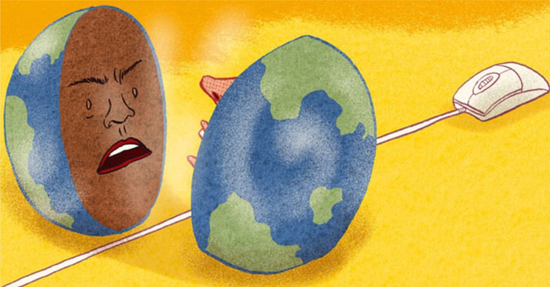
The digital divide refers to the unequal distribution of access to technology and the internet between different populations, often based on socio-economic status, geographic location, and other factors. In low- and middle-income countries (LMICs), this divide can have significant impacts on social and economic development.
Social Digital Divide
On the social side, limited access to technology and the internet can result in a lack of connectivity, information, and opportunities. For example, people who live in rural areas or have low incomes may be less likely to have access to online educational resources, which can limit their ability to acquire new skills and knowledge.
The lack of access to technology can also make it difficult for people in LMICs to participate in online communities and to connect with others who have similar interests or experiences.
Economic Digital Divide
On the economic side, the digital divide can limit the ability of individuals and businesses in LMICs to participate in the digital economy. For example, small businesses may struggle to compete with larger companies that have greater resources and access to technology.
This can limit their ability to reach new markets, sell their products and services, and grow their businesses. The digital divide can also limit the ability of workers in LMICs to participate in the global workforce and to take advantage of remote work opportunities.
Digital Divide Impact
The digital divide can create a vicious cycle, in which those without access to technology and the internet are left behind, unable to acquire the skills and knowledge necessary to participate in the digital economy and to achieve economic and social progress.
It is therefore important for governments, international organizations, and private sector companies to work together to close the digital divide in LMICs and to ensure that everyone has access to the technology and information they need to thrive in the digital age.
Published on: Jan 27 2022 by Guest Writer - Comments Off on 10 Ways Cybersecurity Can Improve Digital Development Outcomes
Rapid digital transformation – underpinned by affordable communications and cheap devices – has introduced new risks and vulnerabilities that cannot be ignored....
Published on: Dec 29 2021 by Guest Writer - Comments Off on The Economic Cost of the Gender Gap Digital Exclusion
Across the world, millions of people are still unable to access the internet and participate online — and women are disproportionately excluded. Men are 21% more...
Published on: Dec 15 2021 by Josh Woodard - Comments Off on US Global Food Security Strategy Gets A Digital Development Upgrade!
The new U.S. Government Global Food Security Strategy (GFSS), from 2022-2026, has recently launched with some notable changes when it comes to digital development....
In January 2021, Deutsche Gesellschaft für Internationale Zusammenarbeit (GIZ) GmbH conducted a series of interviews as part of a strategic foresight project....
COVID-19 has put a spotlight on the digital divide within, between countries and regions, making access to digital platforms and services a key priority to reach...
The COVID-19 pandemic significantly exacerbated the already profound implications of having 3.7 billion unconnected people across the globe. Unconnected populations...
The acceleration of digital health services during the pandemic has been accompanied by growing concerns about the ‘digital divide’ in global healthcare. The...
Published on: May 27 2021 by Guest Writer - Comments Off on My Lessons Learned Inspiring African Girls to Transform Their Digital Future
I want to connect underprivileged schoolgirls with role models to advance career exposure, entrepreneurship, and life skills development in Science, Technology,...
As countries are operationalizing their COVID-19 pandemic response plans, including National Deployment and Vaccination Plans for COVID-19 vaccines, the need for...
2020 was a year like no other. COVID-19 digital response heightened the global need for humanitarian assistance by exacerbating existing crises and creating new...












